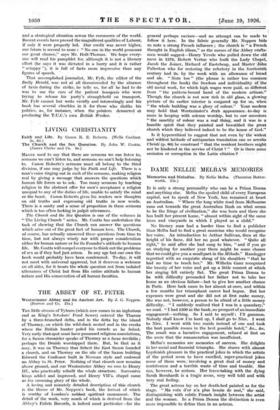DAME NELLIE 'MELBA'S MEMORIES
IT is only a strong personality who can be a Prima Donna and anything else. Melba the, spoiled child of every European capital, not to speak of New York", has remained at heart an Australian. " Where the long white Mad from Melbourne runs out towards the great Australian Bush on what seems to be the fringe of civilization," she was born and there she has built her present home, " almost within sight of the same trees and vineyards in which I played as a child."
No literary man had a harder time to find a publisher than Melba had to find a great musician who would recognize her voice. An introduction to Arthur Sullivan, then at the height of his fame, did her no good whatever. " Quite all right," he said after she had sung to him, " and if you go on studying for another year there might be some chance that we could give you a small part in the Mikado." Randegger regretted with an exquisite shrug of his shoulders " that he had no time to teach her." Mr. Wilhelm Ganz recognized the beauty of her voice and got up a little concert at which her singing fell entirely flat. The great Prima Donna to be with difficulty persuaded her father not to take her home as an obvious failure—but to give her another chance in Paris. Here luck came to her almost at once, and within a few months her triumphant career had begun. But her expenses were great and she did not at first make money., She was not, however, a person to be afraid of a little money difficulty. "1 soddenly realized that I was in a quandary," we read. " I had £200 in the bank, no prospect of an immediate engagement—nothing. So I said to myself : I'll gammon. Nobody shall know I'm hard up, I shall go to Nice, I went to Nice. I went with two maids instead of one and took the best possible rooms in the best possible hotel," &c., &c. The result was a lucrative engagement, refused at first on the score that the remuneration was insufficient.
Melba's memories are memories of success. She delights in her social and financial triumphs. She shares with almost hoydenish pleasure in the practical jokes in which the artists Of the period seem to have excelled, super-practical jokes some of them were,' involving a great deal of money and contrivance and a terrible waste of time and trouble. She can, however, be serious. Her leave-taking with the dying Sarah Bernhardt is a tragic scene, very well told and with very real feeling.
The great actress lay on her death-bed painted as for the stage. " Ma voix d'or n'a plus besoin de moi," she said, distinguishing with subtle French insight between the artist and the woman. In a Prima Donna the distinction is even more impossible to define than in an actress.










































 Previous page
Previous page